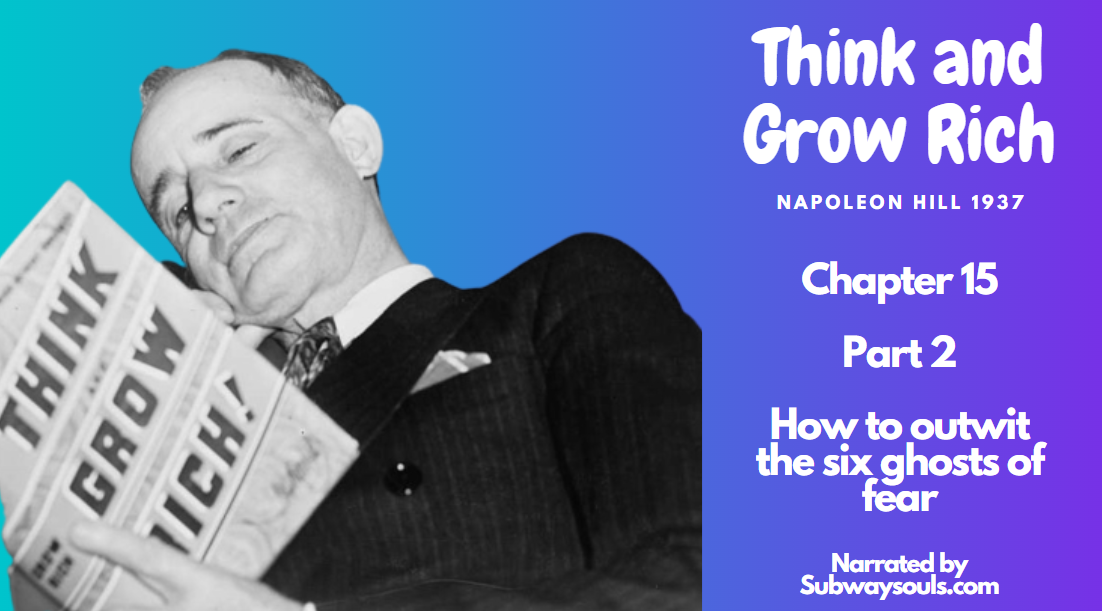Chapter 15 of “Think and Grow Rich” by Napoleon Hill is titled “How to Outwit the Six Ghosts of Fear.” This chapter focuses on identifying and overcoming the six common fears that often hold individuals back from achieving success. Here is a summary of the key points covered in this chapter:
- The six ghosts of fear: Hill identifies the six ghosts of fear as fear of poverty, criticism, ill health, loss of love, old age, and death. These fears can paralyse individuals and prevent them from taking the necessary steps towards success.
- The destructive power of fear: Hill emphasizes that fear is a destructive force that can sabotage one’s ambitions and potential. It often stems from negative programming and limiting beliefs.
- Analysing and understanding fear: Hill encourages individuals to analyse their fears and understand their origins. By dissecting and examining their fears, individuals can gain clarity and perspective, and realize that many fears are based on false assumptions or past experiences.
- The antidote to fear: Hill suggests that the antidote to fear is taking action. By confronting and facing one’s fears head-on, individuals can diminish their power and build courage.
- Developing self-confidence: Hill emphasizes the importance of building self-confidence as a means to combat fear. By focusing on past successes, learning from failures, and surrounding oneself with positive influences, individuals can strengthen their belief in their abilities.
- Mastering thoughts and emotions: Hill advises individuals to master their thoughts and emotions to overcome fear. By consciously choosing positive and empowering thoughts, and managing negative emotions, individuals can create a mental environment that is conducive to success.
- Seeking knowledge and information: Hill emphasizes the importance of seeking knowledge and information to counteract fear. By acquiring specialized knowledge and understanding, individuals can increase their confidence and competence in specific areas.
- Persistence and determination: Hill stresses the role of persistence and determination in overcoming fear. By refusing to give in to fear and maintaining a strong commitment to one’s goals, individuals can push through challenges and achieve success.
- Utilizing the power of the mastermind: Hill encourages individuals to seek the support and collaboration of like-minded individuals through the power of the mastermind. By surrounding oneself with a supportive network, individuals can gain strength and inspiration to overcome fear.
In summary, Chapter 15 of “Think and Grow Rich” addresses the topic of overcoming the six common fears that hinder success. It emphasizes the importance of analysing and understanding fears, taking action to diminish their power, building self-confidence, mastering thoughts and emotions, seeking knowledge, and leveraging the power of the mastermind. By confronting and outwitting these fears, individuals can break free from limitations and achieve their goals and aspirations.
NB: The above is one chapter from the book “Think and Grow Rich” written by Napoleon Hill and first published in 1937.
It is considered one of the most influential self-help books ever written and has sold millions of copies worldwide. The book aims to inspire readers to achieve success in their personal and professional lives by adopting a mindset of wealth and abundance.
The central theme of “Think and Grow Rich” is that success begins with one’s thoughts and beliefs. Napoleon Hill presents a philosophy of success based on the idea that our thoughts can directly influence our actions and ultimately shape our reality. He argues that by developing a burning desire for a specific goal and aligning one’s thoughts, beliefs, and actions with that desire, individuals can overcome challenges and achieve extraordinary success.
Throughout the book, Napoleon Hill shares principles and strategies for achieving success. These include:
1. The power of thought: Hill emphasizes the importance of maintaining a positive mental attitude, visualizing success, and having a clear and definite purpose.
2. Goal setting: He encourages readers to set specific, measurable, achievable, relevant, and time-bound goals (often referred to as SMART goals) and to create a detailed plan for their attainment.
3. Persistence: Hill emphasizes the need for persistence in the face of challenges, setbacks, and failures. He suggests that persistence is a key trait shared by successful individuals.
4. Mastermind groups: Hill emphasizes the importance of surrounding oneself with like-minded individuals who share similar goals and aspirations. He believes that collaborating and exchanging ideas with such a group can lead to greater success.
5. The subconscious mind: Hill explores the power of the subconscious mind and suggests techniques for programming it to support success. He introduces the concept of autosuggestion, which involves repeating positive affirmations and beliefs to reprogram the subconscious mind.
6. The importance of action: Hill emphasizes the need to take consistent and decisive action towards one’s goals. He argues that thoughts alone are not enough; they must be accompanied by action.
“Think and Grow Rich” also features numerous anecdotes and success stories from notable figures such as Thomas Edison, Henry Ford, Andrew Carnegie, and many others. These stories serve to illustrate the principles discussed in the book and provide inspiration and motivation for readers.
Overall, “Think and Grow Rich” presents a philosophy of success that focuses on the power of thoughts, beliefs, and actions. It provides practical strategies and principles that individuals can apply to achieve their goals and attain wealth, not just in terms of money but also in terms of personal fulfilment and happiness.

